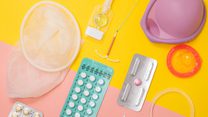From the onset of the menstrual cycle, there are many facets that may be puzzling, worrisome and even down right painful. The key step involves confiding in a trusted healthcare provider who can give essential one-on-one counselling to successfully navigate this challenging time in a young girl’s, teenager’s or adult woman’s life. Of all the tools for treatment, the most powerful is knowledge from a compassionate and reliable source.
On This Page
Understanding What is Happening
During the menstrual cycle, an egg is released by one of two ovaries and then travels to the uterus through one of the fallopian tubes. Body tissue and blood cells form a thin layer of material on the walls of the uterus to protect the egg, but if an egg remains unfertilised, the body will no longer need this protection and shed the lining during menstruation. This shedding is known as a 'period'.
The average age for starting your menstrual cycle is 12 years old but there is some variance. If your daughter hasn’t shown any of the early signs of puberty (i.e. growth spurt, body odour, mood swings) by the age of 14, there can be reason for concern, and she should see a doctor who understands the stages of puberty. If she has had some body changes, then you should not be too worried unless she has not started periods by age 16.
The first few periods in puberty are usually irregular. If, after a year, her periods have not settled into a regular pattern, there may be cause for concern. Seek support if this interferes with her schooling or extracurricular activities, or if the gap between periods is longer than three months.
Remember:
It is important to have the contraception conversation early on as girls can still get pregnant even before their periods have regulated.
What to Have on Hand

It is important to talk to your daughter about what to expect from her period. The first few periods are not usually heavy, and she can expect to change a pad or tampon three to four times a day. It’s important to avoid the contraceptive pill for a couple of years after the start of periods as it may interfere with the final stages of puberty, including full breast development and achieving full adult height. Seek medical advice.
Some girls experience period cramps the day before or during the first two days of menstruation, and the experience can be frightening at first. Typically, cramps are felt in the lower tummy and back area and sometimes at the top of your thighs. Pain can be managed with a combination of paracetamol and ibuprofen as they work together to reduce pain. Or alternate acetaminophen and ibuprofen.
Complications & Concerns
Throughout a girl’s life, it’s likely that she will experience some kind of issue or concern regarding her period, and sometimes it can affect daily life. But there is help and support available.
A good idea is for her to keep track of her cycle by keeping a period diary. It can be very useful for various reasons, including tracking ovulation, but particularly when identifying potential health problems. She can figure out what’s normal for her and what isn’t. If she decides to seek help from a General Practitioner (GP) or gynaecologist, the diary will give her doctor a detailed idea of what happens, and when, during a cycle.
Painful or Heavy Periods
Experiencing pain during a period is very common. The pain is usually caused by the release of a natural chemical from the uterus and the contraction of the womb trying to expel the blood. Over-the-counter painkillers, including paracetamol and ibuprofen, can often help relieve this pain.
Like with pain, it can be normal to have heavy periods. They may be heavier at the start of a period, during menopause or after pregnancy, and some women just naturally have heavier periods than others.

Irregular Periods
Irregularity is common during puberty, in the lead-up to the menopause and when you change your method of contraception.
The first day of a menstrual cycle is the day you get your period, and the last day of a cycle is the day before you get your next period. The length of a cycle varies from woman to woman, but the average length is 28 days. Periods would be considered irregular if they occur less than 21 days or more than 35 days apart. Periods are also considered irregular when there is a wide variation in the amount of blood lost each month and the number of days a period lasts. This is where that helpful period diary will come in handy!
There are several reasons why a period may become irregular, including pregnancy (a missed period is often an early sign of pregnancy), hormonal contraception, stress or anxiety, exercising or a significant change in weight. However, irregular periods can also be a sign of conditions like polycystic ovary syndrome and an underactive thyroid gland.
PMS (Premenstrual Syndrome)
Premenstrual syndrome is the term given to the symptoms a woman experiences in the lead-up to her period, and most women experience PMS at some point. It’s thought that PMS is caused by changes in hormone levels during a menstrual cycle. The symptoms of PMS vary and can be different from month to month. Common symptoms include feeling anxious, upset or irritable, breast tenderness, headaches, tiredness and trouble sleeping, mood swings, spotty skin and bloating. These symptoms usually intensify towards the end of a cycle, before easing once a period starts.
You can try to ease PMS symptoms by exercising regularly and eating a balanced diet, getting plenty of sleep, and taking painkillers such as paracetamol and ibuprofen. Again, keeping track of symptoms in a period diary for at least two or three cycles is very helpful to take to a doctor if PMS is affecting day-to-day life.
Related Articles
Endometriosis
Endometriosis is a condition whereby cells similar to the lining of the uterus grow outside of the uterus, such as the fallopian tubes and ovaries. This long-term condition can affect women of any age, including teenagers, and can have a significant effect on one's life.
Though some women with endometriosis experience no symptoms, for others it is often very painful, especially during periods. And though fertility issues can develop as a result of endometriosis, there are treatments available.
While pelvic cramping is normal during periods, endometriosis pain is far worse than ‘normal’. Other common symptoms include pain during sex, pain during bowel movements or urination, heavy periods, nausea, and constipation or diarrhoea. For some, the effects of the condition can lead to anxiety and depression.
The severity of pain may not be a sign of the extent of endometriotic growths — one woman may experience no pain but, in fact, have significant tissue growth, while another may be the opposite. Endometriosis symptoms may mimic conditions such as irritable bowel syndrome (IBS), interstitial cystitis, pelvic inflammatory disease or ovarian cysts, so it’s very helpful to use the period diary to help your doctor find the right cause.
The main concern with endometriosis is infertility, and one treatment option is having surgery to remove the endometriosis tissue. However, a doctor may suggest other options, such as hormone medicines, including contraceptive therapy (pills, injectables, vaginal rings, subdermal and IUDs).
Diagnosing & Over-Diagnosing
As with any issues relating to your menstrual cycle, including those mentioned, it’s always best to visit a doctor. They will want to know symptoms, how long you’ve experienced them and information on a usual menstrual cycle and regularity. It’s likely the doctor will perform a pelvic exam to look at the vagina and cervix to see if there is inflammation, infection or abnormal tissue, as well as conduct a pap smear and cultures. Blood tests can help determine hormonal imbalances and a pelvic ultrasound may also be helpful.
Conditions can occur at any age, including teenage years, but diagnosing them is a challenge, and should only be done by a doctor with expertise in adolescent gynaecology to avoid overdiagnosis. The focus should be on managing symptoms and allowing your daughter to achieve her full potential, rather than giving her labels.







